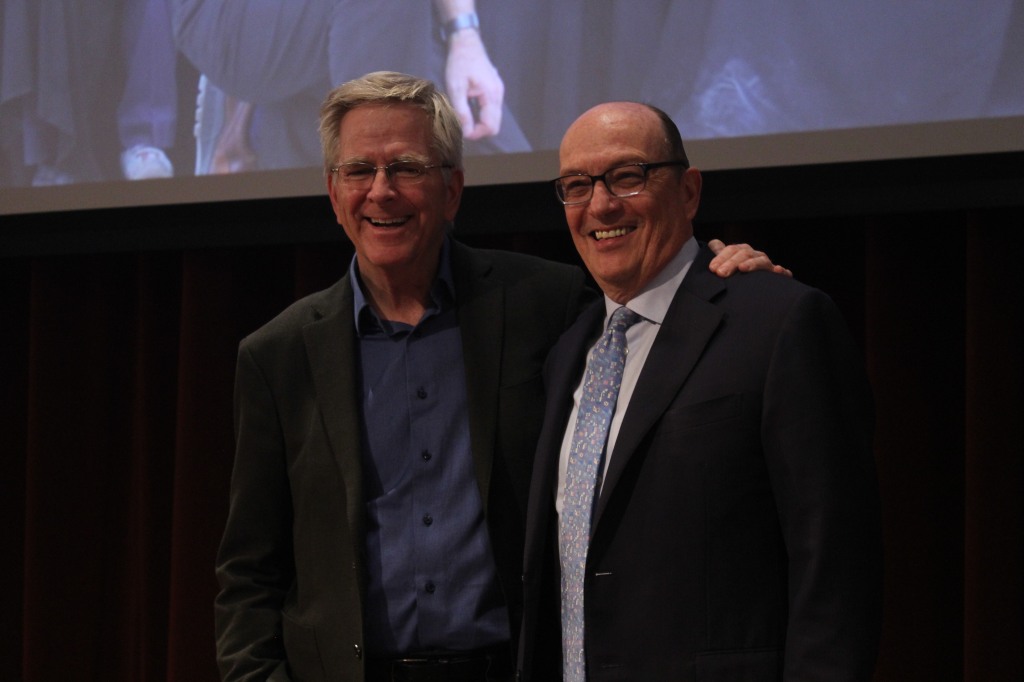“Love thy neighbor…”
A quote that sums up Rick Steves’s exciting, and groundbreaking speech to The World Affairs Council of Charlotte community, exploring how Americans “travel as a political act,” they come home with the greatest of all souvenirs: a broader perspective. Steves has made his mark with the travel and international community as a renowned best-selling travel writer, author, activist, and charismatic television host of “Rick Steves’ Europe.”
According to Steves, travel is a profound exploration of humanity. Beyond the delectable cuisines and sunny shores lies an opportunity for American travelers to step out of their comfort zones and embrace a deeper understanding of our interconnected world. In his captivating slideshow lecture with WACC, Rick Steves shares insights gleaned from his extensive travels across Europe, Central America, Asia, and the Middle East. He challenges us to view travel not just as leisure but as a political act, one that enriches our lives with empathy and broadens our perspectives. As we venture into the unknown, we return not only with cherished memories but also with a profound appreciation for the diverse tapestry of humanity.
Charlotte Country Day School senior Riley Reddinger, was captivated and inspired by Steve’s interesting lecture, and shared her experience with WACC, summarizing all of the exciting details.
President and CEO of WACC, Ljubomir Stambuk, introduced Rick Steves as “a friend of Charlotte, and that Charlotte is the friend of Rick Steves.” Rick Steves then introduced his books For the Love of Europe, which comprises his best 100 articles, and Travel as a Political Act, which is about his more impactful trips. He then explained how “Europe is a spring pool of exploration.” Steves commented that having a love for the world celebrates happiness and understanding with others. When you travel, your ability to see the world as it is grows exponentially.
He shared tips and tricks that he found successful on his travels, from booking a room to avoiding tourist scams through the book Europe Through the Back Door, which he wrote early on in his career. In his book Europe 101, he shares the history and background of art in Europe. He referenced the book Travel as a Political Act, highlighting that traveling helps broaden perspective. He stated that you can learn the most about home by seeing it from another perspective and described culture shock as good because it is just “growing pains of a broadening perspective.” He wants people to have transformational travel and learn about different cultures.
He shared that he was 14 when he first went abroad to Norway with his family and now fully understands how much his parents loved him to bring him along on their travels. He believes this is one of his most impactful trips because it exposed him to the world outside America and sparked his love for travel. He thinks one can travel with the window up or down. People can be mentally protected in their travels or be exposed to the truths of the situations. Ultimately, people should do reality travel that exposes them to other cultures. He used the quote by Thomas Jefferson multiple times – “Traveling makes people wiser, but less happy.”
The main takeaway from Rick Steves’s speech should be to “love thy neighbor.” Throughout his travels, he always sought companionship, whether journeying with fellow travelers or engaging with locals in the areas he visited. Travelers could be seekers of knowledge, pilgrims embarking on a spiritual journey, or tourists simply seeking leisure. For him, the road was not just a path but a vast playground of discovery. He believed that solely relying on advertisements would deprive one of encountering the most enlightening destinations.
Steves concluded that the richness of a journey is measured by the multitude of people one meets along the way, illustrating the extent of its success and serving as a testament to personal growth. He strongly advocates for American participation in global affairs, acknowledging the significance of both America and its citizens engaging with the broader international community.
He has seen the gratitude that Europeans showed Americans for their past help in crises and wars. He asserted that “you need bridges more than you need walls.” Every country has its own dreams and baggage. If people reach out to other countries and build bridges, we can become better people with a better understanding of the world.
On a more poignant note, he talks about how the effects of climate change are very apparent in Europe, even though they are not as visible in America. Traveling to Europe allows people to see the true impact of climate change.
Steves also touched on the conflict between Israel and Palestine, stating that people need to understand the situation from both sides of the wall. If America continues to help other countries, they will be more inclined to be grateful. He closed his speech by saying that “soft power does not create enemies.” We need to make friends, not enemies.
Concluding this enlightening evening, The World Affairs Council of Charlotte extends its heartfelt gratitude to Rick Steves for gracing us with his profound insights and unwavering passion for global exploration.
From the laughter that filled the room to the nods of agreement and moments of contemplation, it’s evident that this event was not just informative but also immensely enjoyable. Rick’s ability to blend captivating storytelling with profound reflections has sparked a renewed sense of curiosity and wanderlust among our council guests.







